|
  Giants:
(The Archaeological Record) Giants:
(The Archaeological Record)
References to giants can be found in myths and texts around the ancient
world.. including several
examples in the archaeological record too, but were there ever such breeds
of people, who were they and what role
did they play in human history....
Giants
are frequently mentioned in the earliest of ancient texts. Perhaps significantly, the first
book of
the Bible (Genesis) records that
there were giants on the earth...
Article:
(March, 2012) - Source: BILD.de
'Remains of
Giant Found in Egypt'.
According to
the German newspaper, BILD.de, a researcher named Gregor Sp�rri
has presented a number of photos of a mummified giant finger.
These incredible images are now being shown to the public for
the first time. The finger is 15 inches long and if it is
genuine, it belonged to someone who was more than 16 feet tall!
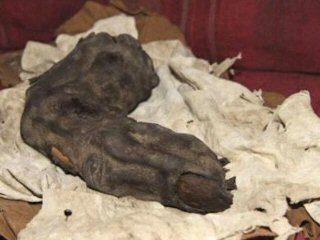
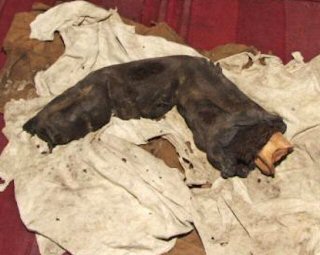
Apparently, the photos were taken during
excavation in 1988, but they have not been published until now.
Unfortunately, this finger is not housed in any Egyptian museum.
In 1988, Gregor Sp�rri came in contact with "an old man from a
grave robber dynasty." Sp�rri had to pay 300 dollars to see the
mummified finger and take pictures of it.
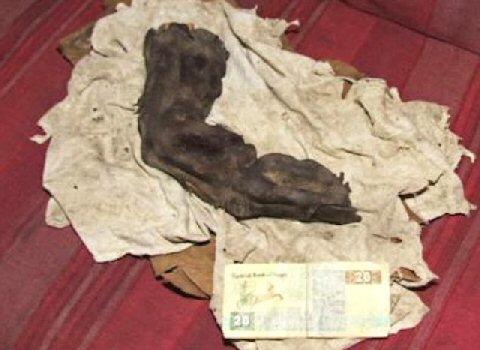
In 2009, Gregor Sp�rri returned once again to
Egypt and tried to find the old man to learn more about this
extraordinary discovery. Unfortunately, Sp�rri was unable to
located the man.
The story remains unconfirmed....!
|
References to
Giants in
Ancient Text:
|
|
Biblical references to giants:
Genesis 6:4
- 'There were giants in the earth in those days; and also after that,
when the sons of God came in unto the daughters of men, and they bare
children to them, the same became mighty men which were of old, men of
renown'.
Numbers
13:33
- 'And there we saw the giants, the sons of Anak, which come of the
giants: and we were in our own sight as grasshoppers, and so we were in
their sight'.
Deuteronomy
1 :28
- 'Whither shall we go up? our brethren have discouraged our heart,
saying, the people are greater and taller than we; the cities are great
and walled up to heaven; and moreover we have seen the sons of the Anakims there'.
2:10
-
'The Emims dwelt therein in times past, a people great, and many, and
tall, as the Anakims;
11
Which also were
accounted giants, as the Anakims; but the Moabites called them Emims'.
2:20 - References
to a 'race' of giants who: 'dwelt therein in old time; and
the Ammonites call them Zamzummims;
21
A
people great, and many, and tall, as the Anakims; but the LORD destroyed
them before them; and they succeeded them, and dwelt in their stead':
3:11
- 'For only Og king of Bashan remained of the remnant of giants; behold
his bedstead was a bedstead of iron; is it not in Rabbath of the
children of Ammon? nine cubits was the length thereof, and four cubits
the breadth of it, after the cubit of a man'.
(This bed is
6 feet wide, 14 feet long and King Og's height is estimated at least 12
feet.)
Joshua xv. 14; Judges i. 20; and Numbers
xiii. 33
- ANAK, father of the Anakim.
'The Hebrew spies said they were mere grass-hoppers in comparison with
these giants' (3)
Other Textual
References to
Giants:
The Book of
Giants: The Book of Giants was a work
apparently composed in Syriac (an eastern dialect of Aramaic). The book
was entirely lost until the twentieth century, but scant references to
it survived in Latin, Greek, and Arabic, indicating that it involved
battles of the ancient giants. Then about a century ago many highly
fragmentary Manichean works written in Central Asian languages were
recovered archaeologically at Turfan, in China (and much of the find
remains unpublished even at present).
(Ref:
http://www.st-andrews.ac.uk/~www_sd/bgiants.html)
The Epic of Gilgamesh:
What is claimed as the oldest surviving
epic-story
in the world; 'The epic of Gilgamesh' also includes a references
to giants. Gilgamesh and Enkidu go together to fight the evil Humbaba at
the cedar mountains. The evil giants face was like
a lion, a roar like a flood, a mouth of flames, breath that burns trees,
and teeth like a dragons. In the end they cut off his head.
(Ref: Ch 2, 3 and 4: The Epic of Gilgamesh)
Herodotus in Book 1, Chapter 68:
Describes how the Spartans uncovered in Tegea the body of Orestes which
was seven cubits long -- around 10 feet. In his book, 'The Comparison of
Romulus with Theseus' Plutarch describes how the Athenians uncovered the
body of Theseus, which was of more than ordinary size. The kneecaps of
Ajax were exactly the size of a discus for the boy's pentathlon, wrote
Pausanias. A boy's discus was about twelve centimetres in diameter,
while a normal adult patella is around five centimetres, suggesting Ajax
may have been around 14 feet tall.
Pliny: The
Arabian giant Gabara was 9 feet 9 inches. This Arabian giant is
mentioned by Pliny, who says he was the tallest man seen in the days of
Claudius. (3)
Plutarch: 105 feet in height:
Ant�os is said by Plutarch to have been 60 cubits in height. He
furthermore adds that the grave of the giant was opened by Serbon.
Andronicus II. was 10 feet in
height. He was grandson of Alexius Comnnus. Nictas asserts that he had
seen him.
(3)
Elea'zer:
was 7 cubits (nearly 14 feet). Vitellius sent this giant to Rome; and he
is mentioned by Josephus. (Josephus
speaks of a Jew 10 feet 2 inches).
(3)
|
|
Myths of giants are prevalent
from around the ancient world:
Australian Giants:
Throughout the length and
breadth of central and far western New South wales, Aboriginal
traditions speak of the Bulloo, or 'giant men and women', who they claim
were 3m tall beings who wandered the land eating giant marsupials and
other Australian ice-age 'megafauna' which they killed with large stone
clubs and other giant-size implements.
Further
to the east, there dwelt the 'Jogungs' and 'Goolagahs', or 'giant
hairy ones', tool making giant hominids sometimes confused with the
Yowies, and who may, or may not have been related to the Bulloo.
(Ref:
http://www.theaustralianyowieresearchcenter.com/aboriginal_legends_d.html)
Norse giants:
Of Scandinavian mythology, were evil
genii, dwelling in J�tunheim (giantland), who had the power of
reducing or extending their stature at will.
Norse mythology
includes many references to 'Snow' giants and 'Mountain' giants.
The Giants, were the chief enemies of the gods, particularly the Aesir.
In the Norse world, a giant was called Jotun
or Iotun. There are several different types of giants. The
frost-giants were the most common giants; they lived in Jotunheim,
one of the nine worlds. The capital of Jotunheim was Utgard, the
citadel of the frost-giants and home of Utgard-Loki or Utgardaloki.
Often writers just simply called the home of the giants as Giantland.
There are many places within Jotunheim other than
Utgard. The giant Hrungnir lived in a frontier of Giantland, called
Griotunagardar. The giant Thiassi lived on the mountain called
Thrymheim, with his daughter Skadi.
The other giants were the fire giants, who lived
in Muspelheim. The fire giant named Surt ruled in Muspelheim.
Note that some of the giantesses had become
deified because of the their relationship with the Norse gods, like
Jord, Grid, Gerd and Rind. These giantesses became Asyniur or
goddesses in their own rights, so I have list some of these in this
page and some in the Aesir page.
(Ref:
http://www.timelessmyths.com/norse/giants.html)
Hindu Giants: In Hinduism,
the giants are called Daityas. They were a race who fought against
the gods because they were jealous of their Deva half-brothers. Some
Daityas from Hindu mythology include Kumbhakarna and Hiranyaksha.
Greek Giants: The sons of
Tar�taros and Ge. When they attempted to storm heaven, they were
hurled to earth by the aid of Hercules, and buried under Mount Etna.
Extract from Brewer's 'Dictionary of Phrase and Fable'
(3)
AC�AMAS.
One of the Cyclops. (Greek fable.)
�GƒON,
the hundred-handed. One of the Titans. (Greek fable.)
AG�RIOS. One of
the Titans. He was killed by the Parc�. (Greek fable.)
ALCYONEUS [Al�-si-o-nuce],
or AL�CION.
Jupiter sent Hercules against him for stealing some of the Sun�s oxen. But Hercules
could not do anything, for immediately the giant touched the earth he
received fresh strength. (See below,
ANT�OS.)
At length Pallas carried him beyond the moon. His seven daughters were
metamorphosed into halcyons. (Argonautic Expedition, i. 6.)
AL�GEBAR�.
The giant Ori�on is so called by the Arabs.
ALIFAN�FARON or
ALIPHAR�NON (q.v.).ALO�EOS.
Son of Poseidon Can.
Each of his two sons was 27 cubits high. (Greek fable.)
AM�ERANT. A cruel
giant slain by Guy of Warwick. (Percy: Reliques.)
ANTƒOS (q.v.;
see above, ALCYONEUS).
(See below, 105 feet.)
ARGES (2 syl.).
One of the Cyclops. (Greek fable.)
CHALBROTH.
The stem of all the giant race. (Rabelais: Pantagruel).
C�OS.
Son of Heaven and Earth. He married Ph�b,
and was the father of Latna.
(Greek fable.)
CORMORANT.
A giant discomfited by Sir Brian. (Spenser: Fa�rie Queene,
vi. 4.)
EU�RYTOS.
One of the giants that made war with the gods. Bacchus killed him
with his thyrsus. (Greek fable.)
FERREGUS,
slain by Orgando, was 28 feet in height.
FIOR�GWYN,
the father of Frigga (Scandinavian mythology).
GAL�BARA.
Father of Goliah of Secondille (3 syl.), and inventor of the
custom of drinking healths. (Duchat: �uvres de Rabelais.
1711.)
GALAPAS.
The giant slain by King Arthur. (Sir T. Malory: History of
Prince Arthur.)
GOG�MAGOG.
King of the giant race of Albion; slain by Cori�neus.
GRANGOUSIER.
The giant king of Utopia, father of Gargantua. (Rabelais:
Gargantua.)
GYGES (2 syl.).
One of the Titans. He had fifty heads and a hundred hands. (Greek
fable.)
HIPPOL�YTOS.
One of the giants who made war with the gods. He was killed by
Herm�s. (Greek fable.)
JOTUN.
The giant of J�tunheim or Giant-land. (Scandinavian mythology.)
JULIANCE.
A giant of Arthurian romance.
KOTTOS.
One of the Titans. He had a hundred hands. (See
BRIAREOS.)
(Greek fable.)
MUGILLO.
A giant famous for his mace with six balls.
PYRAC�MON.
One of the Cyclops. (Greek fable.)
RITHO.
The giant who commanded King Arthur to send him his beard to
complete the lining of a robe. In the Arthurian romance.
STER�OPES (3 syl.).
One of the Cyclops. (Greek fable.)
TARTARO. The Cyclops of Basque mythology.
THAON.
One of the giants who made war with the gods. He was killed by the
Parc�. (Greek fable.)
TITANS (The)
YOHAK.
The giant guardian of the caves of Babylon. (Southey: Thalaba,
book v.)
|
|
Gigantism: Recent Examples.
|
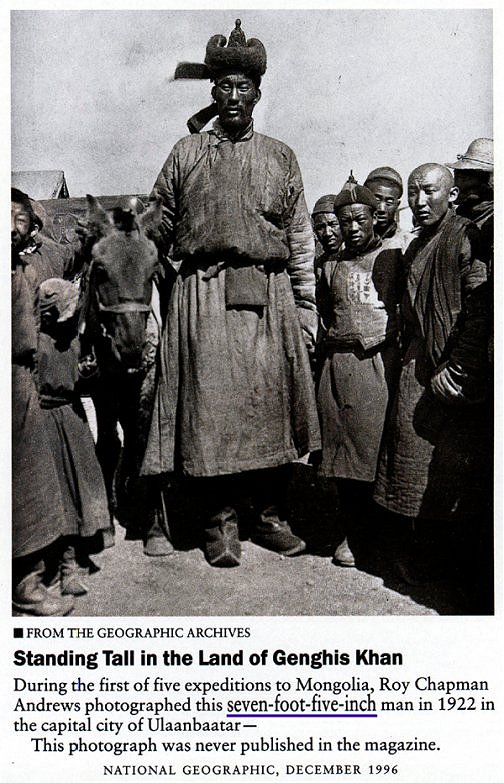
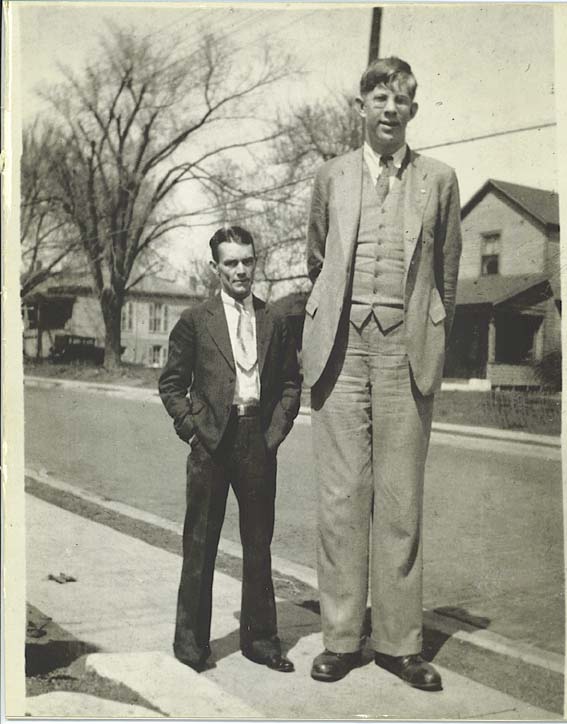
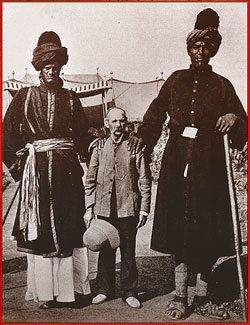
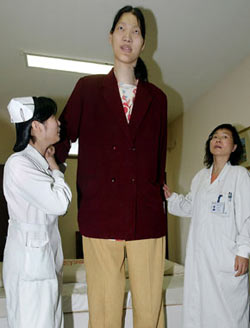
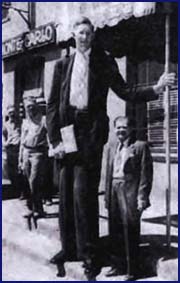
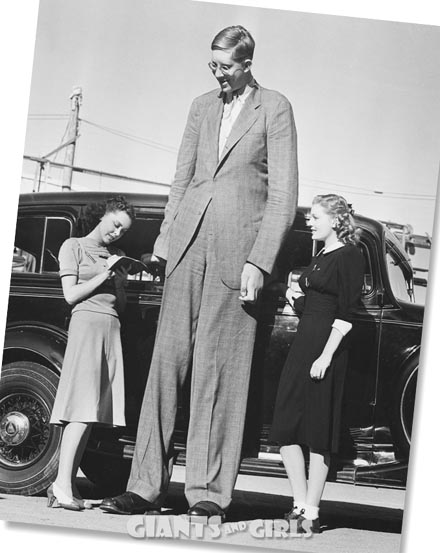
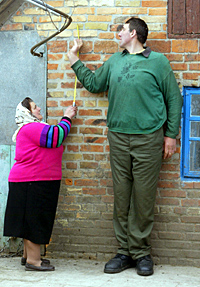
Gigantism: Extract from Brewer's 'Dictionary of Phrase and Fable'
(3)
BAMFORD (Edward)
was 7 feet 4 inches. He died in 1768, and was buried in St. Dunstan�s
churchyard.
BATES (Captain)
was 7 feet 11 1/2 inches. He was a native of Kentucky, and was exhibited in
London in 1871. His wife (Anna Swann) was the same height.
BLACKER (Henry)
was 7 feet 4 inches, and most symmetrical. He was born at Cuckfield, in
Sussex, in 1724, and was called �The British Giant.�
BRADLEY (William)
was 7 feet 9 inches in height. He was born in 1787, and died 1820. His birth
is duly registered in the parish church of Market Weighton, in Yorkshire, and
his right hand is preserved in the museum of the College of Surgeons.
BRICK (M. J.) exhibited
under the name of Anak, was 7 feet 8 inches in height at the age of 26. He was
born in 1840 at Ramonchamp, in the Vosges, and visited England 1862�5. His
arms had a stretch of 95 1/2 inches, and were therefore 3 1/2 inches too long
for symmetry.
BRUSTED (Von)
was 8 feet in height. This Norway giant was exhibited in London in 1880.
BUSBY (John) was
7 feet 9 inches in height, and his brother was about the same. They were
natives of Darfield, in Yorkshire.
CHANG, the Chinese
giant, was 8 feet 2 inches in height. The entire name of this Chinese giant
was Chang-Woo-Goo. He was exhibited in London in 1865�1866, and again in 1880.
He was a native of Fychou.
CHARLEMAGNE was nearly
8 feet in height, and was so strong he could squeeze together three horseshoes
with his hands.
COTTER (Patrick)
was 8 feet 7 1/2 inches in height. This Irish giant died at Clifton, Bristol,
in 1802. A cast of his hand is preserved in the museum of the College of
Surgeons.
ELEIZEGUE (Joachim).
Was 7 feet 10 inches in height. He was a Spaniard, and exhibited in the
Cosmorama, Regent Street, London.
EVANS (William)
was 8 feet at death. He was a porter of Charles I., and died in 1632.
FRANK (Big). Was
7 feet 8 inches in height. He was an Irishman whose name was Francis Sheridan,
and died in 1870.
FRENZ (Louis)
was 7 feet 4 inches in height. He was called �the French giant.�
FUNNUM (court giant of
Eugene II.) was 11 feet 6 inches.
GILLY was 8
feet. This Swedish giant was exhibited in the early part of the
nineteenth century.
GORDON (Al�ce) was 7
feet in height. She was a native of Essex, and died in 1737, at the
age of 19.
HALE (Robert) was 7
feet 6 inches in height. He was born at Somerton, in Norfolk, and was
called �the Norfolk giant� (1820�1862).
HAR�DRADA (Harold) was
nearly 8 feet in height (�5 ells of Norway�), and was called �the
Norway giant.� Snorro Sturleson says he was �about 8 feet in height.�
HOLMES (Benjamin) was 7
feet 6 inches in height. He was a Northumberland man, and was made
sword-bearer of the Corporation of Worcester. He died in 1892.
JOHN FREDERICK, Duke
of Brunswick, was 8 feet 6 inches in height.
LA PIERRE was 7 feet
1 inch in height. He was born at Stratgard, in Denmark.
LOUIS was 7 feet 4 inches in
height. Called �the French giant.� His left hand is preserved in the
museum of the College of Surgeons.
LOUISHKIN was 8 feet 5 inches
in height. This Russian giant was drum-major of the Imperial Guards.
MCDONALD (James)
was 7 feet 6 inches in height. He was born in Cork, Ireland, and died
in 1760.
MCDONALD (Samuel)
was 6 feet 10 inches in height. This Scotchman was usually called �Big
Sam.� He was the Prince of Wales�s footman, and died in 1802.
MAGRATH (Cornelius) was
7 feet 10 inches in height at the age of 16. He was an orphan reared
by Bishop Berkeley, and died at the age of twenty (1740�1760).
MAXIMI�NUS was 8 feet 6 inches
in height. The Roman emperor, from 235 to 238.
MELLON (Edmund) was 7
feet 6 inches in height at the age of nineteen. He was born at Port
Leicester, in Ireland (1740�1760).
MIDDLETON (John) was 9
feet 3 inches in height. �His hand was 17 inches long and 8 1/2
broad.� He was born at Hale, Lancashire, in the reign of James J.
Dr. Plott: Natural History of Staffordshire, p. 295.)
MILLER (Maximilian
Christopher) was 8 feet in height. His hand measured 12 inches,
and his forefinger was 9 inches long. This Saxon giant died in London
at the age of sixty (1674�1734).
MURPHY was 8 feet 10 inches in
height. This Irish giant was contemporary with O�Brien (see below),
and died at Marseilles.
O�BRIEN, or CHARLES BYRNE,
was 8 feet 4 inches in height. The skeleton of this Irish giant is
preserved in the College of Surgeons. He died in Cockspur Street,
London, and was contemporary with Murphy (1761�1783).
O�BRIEN (Patrick) was 8
feet 7 inches in height. He died August 3, 1804, aged thirty-nine.
OSEN (Heinrich) was 7
feet 6 inches in height at the age of 27, and weighed abvoe 37 stone.
He was born in Norway.
PORUS was �5 cubits in height�
(7 feet 6 inches). He was an Indian king who fought against Alexander
the Great near the river Hydasp�s. (Quintus Curtius: De rebus
gestis Alexandri Magni.)
RIECHART (J. H.) was 8
feet 4 inches in height. He was a native of Friedberg, and both his
father and mother were of gigantic stature.
SALMERON (Martin) was 7
feet 4 inches in height. He was called �The Mexican Giant.�
SWANN (Anne Hanen) was
7 feet 11 1/2 inches in height. She was a native of Nova Scotia.
TOLLER (James) was 8
feet at the age of 24. He died in February, 1819.
Becanus asserts that he had seen a man
nearly 10 feet high, and a woman fully 10 feet.
Gasper Bauhin speaks of a Swiss 8 feet
in height.
Del Rio tells us he himself saw a
Piedmontese in 1572 more than 9 feet in height.
C. F. S. Warren, M.A. (in Notes and
Queries, August 14th, 1875), tells us that his father knew a lady
9 feet in height, and adds �her head touched the ceiling of a
good-sized room.�
Vanderbrook says he saw at Congo a
black man 9 feet high.
In the museum of Trinity College,
Dublin, is a human skeleton 8 feet 6 inches in height.
Thomas Hall, of Willingham, was 3 feet
9 inches at the age of 3.
A giant was exhibited at Rouen in the
early part of the eighteenth century 17 feet 10 inches in height.
Gorapus, the surgeon, tells us of a
Swedish giantess, who, at the age of 9, was over 10 feet in height.
Turner, the naturalist, tells us he
saw in Brazil a giant 12 feet in height.
M. Thevet published, in 1575, an
account of a South American giant, the skeleton of which he measured.
It was 11 feet 5 inches.
(Ref: C. Brewer. Dictionary of Phrase
and Fable. 1898)
|
 The
giant (right), was apparently
unearthed in County Antrim, Ireland, and found to be 12ft 2in high. Its
girth of chest was 6ft 6in, and length of arms 4ft 6in. There are six toes
on the right foot. This skeleton was on display in exhibitions in Dublin,
Liverpool and Manchester. What later happened to the giant and its owner is
unknown. The
giant (right), was apparently
unearthed in County Antrim, Ireland, and found to be 12ft 2in high. Its
girth of chest was 6ft 6in, and length of arms 4ft 6in. There are six toes
on the right foot. This skeleton was on display in exhibitions in Dublin,
Liverpool and Manchester. What later happened to the giant and its owner is
unknown.
(Photo from the British Strand magazine. Dec 1895)
Australian aborigines
'When the world was new, when the ancestors appeared from the north
like giants'.
In
old Pleistocene river gravels near Bathurst, N.S.W. huge stone
artifacts-clubs, pounders, adzes, chisels, knives and hand-axes-all
of tremendous weight, lie scattered over a wide area. A fossil
hunter searching the Winburndale River north of Bathurst discovered
a large quartzitised fossil human molar tooth, far too big for any
normal modern human. A similar molar of chert fossilisation was also
recovered from ancient deposits near Dubbo, N.S.W. Prospectors
working in the Bathurst district over 40 years ago frequently
reported coming across large human footprints in shoals of red
jasper.
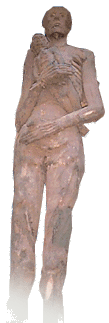
A stone circle in Scotland, nearby to Glenquickan was excavated in the
early 1800's revealing the bones of ...
'a man of uncommon size' (2).
A skeleton
discovered at Lucerne in 1577. (19ft
in height), Dr. Plater is our authority for
this measurement. (3)
Teutobochus, whose
remains were discovered near the Rhone in 1613.
(30ft in height), they
occupied a tomb 30 feet long. The bones of another gigantic skeleton
were exposed by the action of the Rhone in 1456. If this was a human
skeleton, the height of the living man must have been 30 feet.
The
Martindale Mummies (left) were acquired by Ripley's in February 1998
from Dr. Larry Cartmell. The mother and child mummies were
discovered in Yosemite Valley, California in 1891 and first
displayed in Scranton, Kansas in 1899. The origin of the "Martindale
Mummies" remains a mystery. Measuring an incredible 6'8" tall, the
mother is the tallest female mummy ever discovered!
|
|
One of the most prolific regions of the world for
reports of 'giants' is the Americas where numerous records exist of both
skeletal remains and actual sightings.
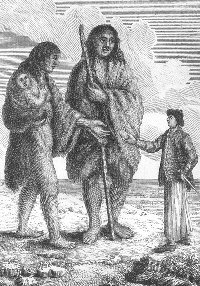 The first chronicled sighting occurred
in 1520, when the Portuguese explorer Magellan anchored his ships in the
harbour of San Julian. On going ashore, he and his crew encountered a
giant of a man, nearly ten feet tall and with the 'voice like a bull'.
Enquiries suggested that he belonged to a tribe of giants who lived
nearby. The first chronicled sighting occurred
in 1520, when the Portuguese explorer Magellan anchored his ships in the
harbour of San Julian. On going ashore, he and his crew encountered a
giant of a man, nearly ten feet tall and with the 'voice like a bull'.
Enquiries suggested that he belonged to a tribe of giants who lived
nearby.
(1) The
etymology of the word is unclear, but Patagonia came to
mean �Land of the Bigfeet.� Magellan seized two of the younger males
as hostages to bring back to Spain, but they apparently got sick and
died on the journey.
This is the 1520s
account of Antonio Pigafetta, chronicler of Ferdinand Magellan�s
expedition:
'One day (without anyone expecting it) we saw
a giant who was on the shore [near today�s Puerto San Juli�n,
Argentina], quite naked, and who danced, leaped, and sang, and while
he sang he threw sand and dust on his head. Our captain [Magellan]
sent one of his men toward him, charging him to leap and sing like
the other in order to reassure him and to show him friendship. Which
he did. Immediately the man of the ship, dancing, led this giant to
a small island where the captain awaited him. And when he was before
us, he began to marvel and to be afraid, and he raised one finger
upward, believing that we came from heaven. And he was so tall that
the tallest of us only came up to his waist. Withal he was well
proportioned. . . . The captain named the people of this sort
Pathagoni'. (4)
Sir Francis Drake, who passed through
San Julian in 1578, mentions that he saw two men who stood nine feet
tall, and in the years that followed similar reports were made by other
explorers such as Pedro Sarmiento, Tome Hernandez, Anthony Knyvet and Sebald de Weert
who all claim to have laid eyes on the South American giants.
(1)
In The World
Encompassed (London, 1628), the first detailed account of Sir
Francis Drake�s circumnavigation, the author, Drake�s nephew of the
same name, wrote:
Magellane was not altogether deceived, in
naming them Giants; for they generally differ from the common sort
of men, both in stature, bignes, and strength of body, as also in
the hideousnesse of their voice: but yet they are nothing so
monstrous, or giantlike as they were reported; there being some
English men, as tall, as the highest of any that we could see, but
peradventure, the Spaniards did not thinke, that ever any English
man would come thither, to reprove them; and thereupon might presume
the more boldly to lie: the name Pentagones, Five
cubits viz. 7. Foote and halfe, describing the full height (if not
some what more) of the highest of them. But this is certaine, that
the Spanish cruelties there used [referring to Magellan�s hostage
taking], have made them more monstrous, in minde and manners, then
they are in body; and more inhospitable, to deale with any
strangers, that shall come thereafter. (4)
He reduced the height of the Patagonians from ten
feet to seven and a half feet but was obviously more intent on
discrediting the Spanish and blaming them for the �monstrosity� of the
giants. Ironically, though, he was really confirming the basic facts
behind the myth.
In 1615, two more travellers, Jacob le
Maire and Wilhelm Schouten, recorded the fact that they had discovered a
pair of human skeletons, each nine feet in length.
(1)
By 1700, the giants seemed to have
moved away from San Julian, and the next official record places them
at Valdivia, Chile. In 1712, the Spanish authorities there filed
repeated reports of a race of giants living in the wild interior,
not many miles from the town.
(1)
The last sighting seems to have taken
place in 1764, when Commodore Byron, grandfather of famous poet, saw
them at Cabo Virgines.
(1)
The following (unconfirmed) list suggests a
genuine need for a re-appraisal of pre-Columbian American history...
In his book, The
Natural and Aboriginal History of Tennessee, author John Haywood describes
"very large" bones in stone graves found in Williamson County, Tennessee,
in 1821.
In White County,
Tennessee, an "ancient fortification" contained skeletons of gigantic
stature averaging at least 7 feet in length.
Giant skeletons were
found in the mid-1800s near Rutland and Rodman, New York.
J.N. DeHart, M.D. found
vertebrae "larger than those of the present type" in Wisconsin mounds in
1876.
W.H.R. Lykins uncovered
skull bones "of great size and thickness" in mounds of Kansas City area in
1877.
George W. Hill, M.D.,
dug out a skeleton "of unusual size" in a mound of Ashland County, Ohio.
In 1879, a nine-foot,
eight-inch skeleton was excavated from a mound near Brewersville, Indiana
(Indianapolis News, Nov 10, 1975).
A six foot, six inch
skeleton was found in a Utah mound. This was at least a foot taller than
the average Indian height in the area, and these natives- what few there
were of them -were not mound builders.
A skeleton which is
reported to have been "of enormous dimensions" was found in a clay coffin,
with a sandstone slab containing hieroglyphics, during mound explorations
by a Dr Everhart near Zanesville, Ohio.(American Antiquarian, v3, 1880,
pg61)
Ten skeletons "of both
sexes and of gigantic size" were taken from a mound at Warren, Minnesota,
1883. (St. Paul Pioneer Press, May 23, 1883)
A skeleton 7 feet 6
inches long was found in a massive stone structure that was likened to a
temple chamber within a mound in Kanawha County, West Virginia, in 1884.
(American Antiquarian, v6, 1884 133f.
Cyrus Thomas, Report on
Mound Explorations of the Bureau of Ethnology, 12th Annual Report,
Smithsonian Bureau of Ethnology, 1890-91).
A large mound near
Gasterville, Pennsylvania, contained a vault in which was found a skeleton
measuring 7 feet 2 inches. Inscriptions were carved on the vault.
(American Antiquarian, v7, 1885, 52f).
In 1885, miners
discovered the mummified remains of woman measuring 6 feet 8 inches tall
holding an infant. The mummies were found in a cave behind a wall of rock
in the Yosemite Valley.
In Minnesota, 1888,
were discovered remains of seven skeletons 7 to 8 feet tall. (St. Paul
Pioneer Press, June 29, 1888).
A mound near Toledo,
Ohio, held 20 skeletons, seated and facing east with jaws and teeth "twice
as large as those of present day people," and besides each was a large
bowl with "curiously wrought hieroglyphic figures." (Chicago Record, Oct.
24, 1895; cited by Ron G. Dobbins, NEARA Journal, v13, fall 1978).
The skeleton of a huge
man was uncovered at the Beckley farm, Lake Koronis, Minnesota; while at
Moose Island and Pine City, bones of other giants came to light. (St. Paul
Globe, Aug. 12, 1896).
In 1911, several
red-haired mummies ranging from 6 and a half feet to 8 feet tall were
discovered in a cave in Lovelock, Nevada.
In February and June of
1931, large skeletons were found in the Humboldt lake bed near Lovelock,
Nevada. The first of these two skeletons found measured 8 1/2 feet tall
and appeared to have been wrapped in a gum-covered fabric similar to the
Egyptian manner. The second skeleton was almost 10 feet long. (Review -
Miner, June 19, 1931)
A 7 ft 7 inch skeleton
was reported to have been found on the Friedman ranch, near Lovelock,
Nevada, in 1939.(Review - Miner, Sept. 29, 1939).
In 1965, a skeleton
measuring 8 feet 9 inches was found buried under a rock ledge along the
Holly Creek in east-central Kentucky.
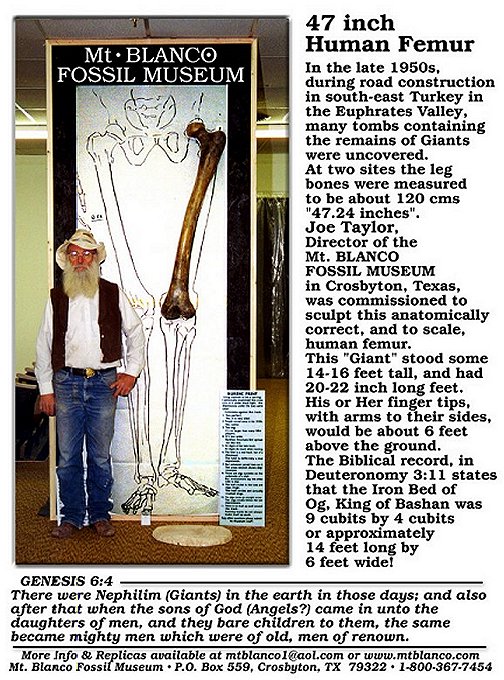
(More about
pre-Columbian America)
|
Look out for a number of modern composite photo's made for fun:
Especially for those that resulted from the 'fake photo' competition.
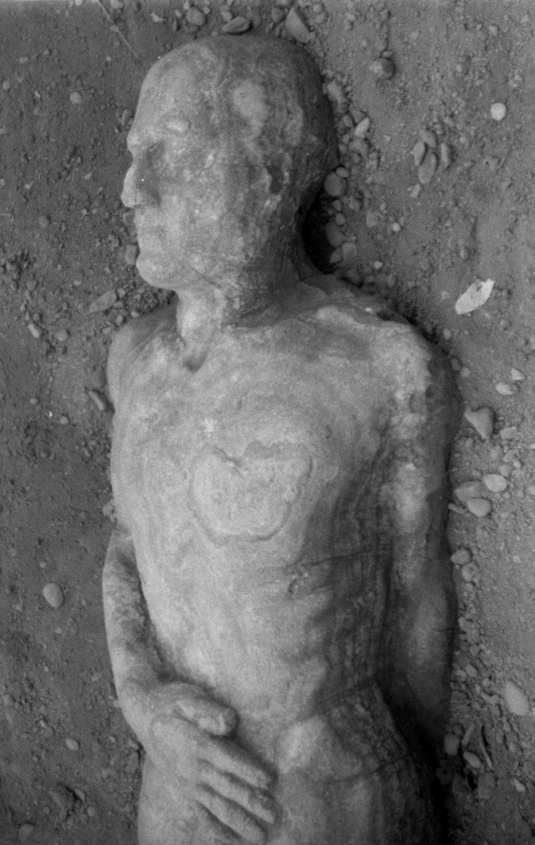
Irish Fakes
- George
Hull was said to have no patience with fools, although he exhibited great patience for
making a fool of others. After arguing with a clergyman who claimed
that giants had walked the earth because the Bible said so, Hull
proceeded to carve a 10-foot gypsum statue of a man. He then buried
his creation on a neighbouring New-York farm. In 1869, a full year
later, Hull hired some well diggers, who discovered his stone man on
the job. Of course people gathered to see this oddity, and rumours
began to spread that it was a fossilized human of gigantic
proportions. Many saw it for the hoax it was, but when two Yale
professors declared it genuine, the proof of giants on earth became
set in stone. Eventually Hull had to admit it was a fake after he sued P.T. Barnum for exhibiting a copy of it. Barnum claimed his statue was
just a hoax of a hoax and was found not guilty.

The photo on the left is from this competition and is a fake.
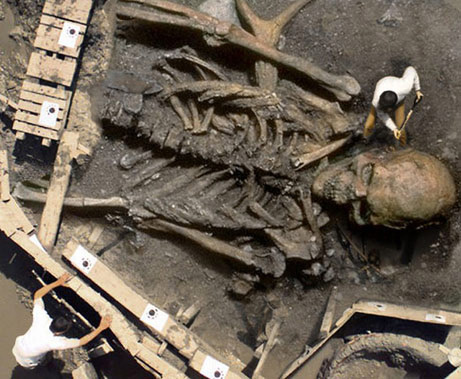
A digitally altered photograph created in
2002 shows a reclining giant surrounded by a wooden platform�with a
shovel-wielding archaeologist thrown in for scale.
By 2004 the "discovery" was being blogged
and emailed all over the world�"Giant Skeleton Unearthed!"�and it's been
enjoying a revival in 2007.
Ref:
http://news.nationalgeographic.com/news/2007/12/071214-giant-skeleton.html
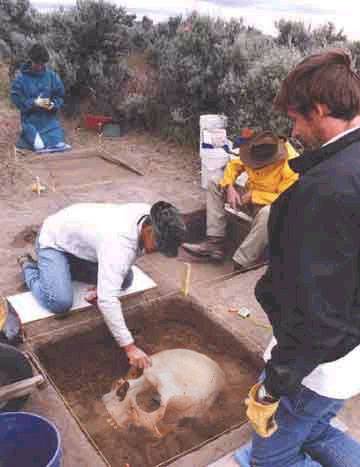
This photo was used to
advertise the competition - held in 2002...
The rules of this game were thus:
You are to create an archaeological hoax. Your job is to show a picture of
an archaeological discovery that looks so real, had it not appeared at
Worth1000, people might have done a double take. As always, quality is a
must. We will remove poor entries no matter how much we like you. You'll
have 48 hours for this contest, so make your submission count. See the
first contest for an idea of what this one is about.
|
|












 The first chronicled sighting occurred
in 1520, when the Portuguese explorer Magellan anchored his ships in the
harbour of San Julian. On going ashore, he and his crew encountered a
giant of a man, nearly ten feet tall and with the 'voice like a bull'.
Enquiries suggested that he belonged to a tribe of giants who lived
nearby.
The first chronicled sighting occurred
in 1520, when the Portuguese explorer Magellan anchored his ships in the
harbour of San Julian. On going ashore, he and his crew encountered a
giant of a man, nearly ten feet tall and with the 'voice like a bull'.
Enquiries suggested that he belonged to a tribe of giants who lived
nearby.




